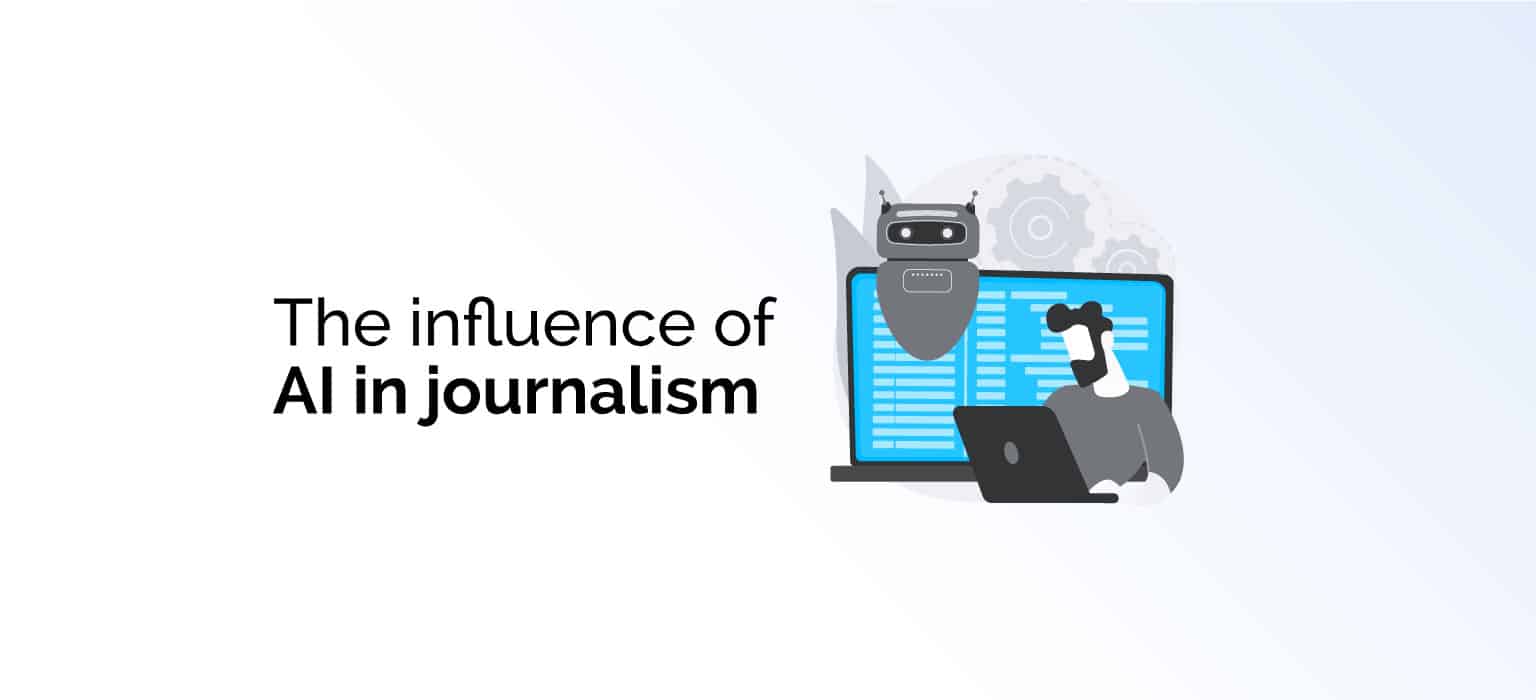Long gone are the days when people would line up to get the latest news on a piece of paper. The good thing about that time was that it took time to produce content which increased the quality of it as more time was spent on it. Also, the earth was a lot cooler back then but that’s a story for another day. But since the end of last year, there has been a new influence – AI in journalism.
Basically, this means that AI models such as ChatGPT have entered their way into journalism, and by the looks of it, they’re here to stay. Is this a good thing or a bad one?
Well, it’s not all black and white, so let’s dive into the gray area.
How does generative AI affect journalism?
Generative AI is changing completely journalism by automating the creation of news content. And it doesn’t only stop there, as the production of content is not the only thing that is affected by AI.
These language models can produce articles and reports in short bursts, which as a result makes the process more efficient and faster namely. Besides the quantity, this doesn’t necessarily guarantee that the quality remains the same.
This approach has raised a lot of concerns about the reliability and authenticity of the information that is generated by AI. Not trying to dismiss AI models completely as they can automate a lot of stuff that takes up the editor’s time, though. The point is not to let it do its job on its own.
Another rather interesting approach when it comes to AI’s effect on journalism is the possibility of AI leading to job replacement for journalists. To be fair, it’s still too early to tell whether this is going to happen, but the possibility remains.
Read also: The Jobocalypse: is AI a threat to jobs?
The new ‘problem’ that journalism will have in the future will be to strike a balance between using generative AI’s benefits but also uphold the trustworthy fundamentals of journalism.
However, it’s important to also acknowledge the ethical implications that AI has in journalism as well. Issues like data privacy, biased information, and potential misuse of technology are something that needs to be kept an eye on.

Pros and Cons of AI in Journalism
Like any other that AI has disrupted, it has a good side and a bad side, and journalism is no exception.
Here are some pros of using AI in journalism
- Efficiency and speed
- Data processing
- Personalized content
- Cross-language reporting
Despite everything, one can’t argue that the speed that ChatGPT responds to is amazingly fast – especially the paid version. When it comes to the pros efficiency and speed are the first things that come to mind. AI tools can automate these time-consuming tasks like data analysis and content generation that allows journalists to focus on more in-depth reporting.
AI models are practically built to analyze large volumes of data fairly quickly. This helps journalists uncover insights and trends that might be challenging – if not impossible – to identify manually. Did you get large volumes of data? Find a proper AI model, feed them to it, and wait for the response. Not only will you save time (duh!) but you will also get a better visualization of these data and a fresher insight
Another rather interesting pro of AI is that it can tailor news content to individual readers’ preferences which can lead to a more engaging and relevant user experience. It’s been a challenge for most of the journalist companies to find a proper way to tackle every reader but ultimately failed. AI, however, could be the solution.
And since AI-powered models are trained in a lot of languages, they are able to translate easily. This can help a lot in cross-language reporting for newspapers that are operating in multiple countries, breaking down language barriers and expanding their reach.
However, there are some cons of AI in journalism
- Biased information
- Unreliability and unoriginality
- Echo chambers
- Ethical concerns
While AI models are great when it comes to producing fast content, it’s important to understand their limitations. And one of these limitations is biased information. AI models inherit everything they use for responses based on the data that they’re fed. If the data they are trained on has potentially skewed or misleading content, so will the responses.
Another issue that needs to be addressed is that AI models are not at all reliable and absolutely not original. They lack the human touch and critical thinking that only human journalists can offer. This raises concerns when it comes to the credibility of the information that is presented. It’s important to know that AI models don’t understand context which makes them a bit off in journalism.
Personalized content delivery could lead to the creation of echo chambers, where users are exposed only to information that aligns with their existing beliefs, limiting diverse perspectives. If the data that the AI model is trained on has only information that you agree with, you’ll get stuck in an echo chamber and never visit new viewpoints.
And obviously the ethical concerns. The ethical usage of AI in journalism is crucial as it arises concerns about the potential misuse, deep fakes, and other AI-generated content that is generated and published without disclosure.
The future of journalism in the world of AI
To understand how close the future of AI in journalism is, Google is already testing if AI can write news. To be fair, they do state that in no circumstance can it replace journalists – yet.
The main concern, however, remains on the authorship. How do I prove that these words are written by a conscious, fully aware of the situation human? Just because the idea is new in terms of the date posted? One way would be to paste every article you read in Crossplag’s AI detector and check if it’s AI-generated or human-written. Hey – is this the future of journalism? Having to check for authenticity every time I read an article? Huh, weird.
While some believe that AI will not diminish the demand for high-quality journalism, the future of journalists remains a bit uncertain. In my opinion, I believe that it will only increase the demand for high-quality journalism and the only concerns are that of the jobs that only require mundane tasks.
It is absolutely evident that AI will play a major role in shaping the future of journalism, but the impact remains to be seen. The prospect of newsrooms with as little as possible human interaction is a high possibility now with the rise of AI. But will the quality and the ethics remain the same?

Agnesa is crazy about math and has won lots of prizes. Although her main gig is being a full-stack developer, she also likes to write about topics she knows really well.
But, Agnesa isn’t just about numbers and algorithms.
When she’s not crunching code or weaving words, you’ll find her conquering mountains with her trusty hiking boots!

